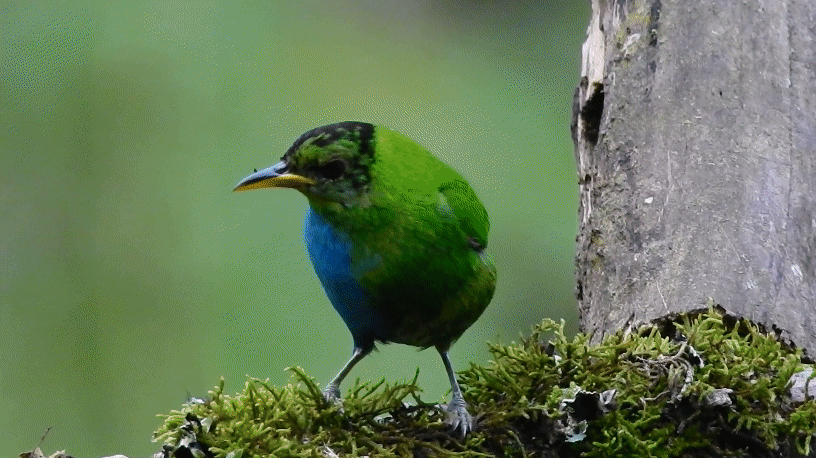Biology
Monarch Butterflies Wintering in California Are Down 30 Percent From Last Year
The insects' population is slowly rebounding from a historic low in 2020, but they remain in crisis, having declined by more than 95 percent since the 1980s
Why Are Flying Insects 'Attracted' to Lights? Scientists May Finally Have an Answer
Moths and other insects might turn their backs toward the brightest source of light around—which has historically been the sky—to determine which way is up and which is down, according to a new paper
Biologists Discover Four New Octopus Species in the Deep Ocean Off Costa Rica
One species was found brooding eggs near low-temperature hydrothermal vents, a rare sight that could unlock new information on deep-sea cephalopods
Mysterious Bass Sounds Irking Florida Residents Might Just Be Fish Mating Loudly
The Tampa community raised money to fund an investigation, and now, a local scientist will install underwater microphones to look for the source of the racket
World's First IVF Rhino Pregnancy Could Save a Nearly Extinct Subspecies
Only two northern white rhinos remain, but the new reproductive breakthrough may pull them back from the brink of erasure
Top Harvard Cancer Institute Will Retract Six Studies and Correct 31 More After Photoshop Claims
British biologist and blogger Sholto David alleged that executives at the Dana-Farber Cancer Institute published papers with manipulated data and images
Cicadas Are Coming: Rare 'Dual Emergence' Could Bring One Trillion of the Bugs This Year
The 13-year and 17-year broods that will emerge from underground this spring will be appearing together for the first time in 221 years
How Are Tardigrades So 'Indestructible?' Scientists Finally Have an Explanation
The tiny animals nicknamed "water bears" can endure extreme conditions by entering a deep hibernation with a switch at the molecular level, a new study finds
In Defense of the Blobfish: The 'World's Ugliest Animal' Is Our Fault
The distinguished blobfish has been judged unfairly
What Happened to the Extinct Woolly Dog?
Researchers studying the 160-year-old fur of a dog named Mutton in the Smithsonian collections found that the Indigenous breed existed for at least 5,000 years before European colonizers eradicated it
Can Killing One Species of Owl Help Save Another?
Biologists and conservationists are grappling with a controversial plan to kill 470,000 barred owls in the Pacific Northwest over the next 30 years
The Scientist Using Bugs to Help Solve Murders
At crime scenes around the world, the forensic entomologist Paola Magni is taking her field into uncharted waters
Scientists Uncover the Earliest Fossil Evidence of Photosynthesis
Ancient cyanobacteria contained structures for producing oxygen around 1.75 billion years ago, according to a new study
Sniffing Women's Tears May Reduce Aggression in Men, Study Finds
The findings, which may extend to all humans, suggest emotional tears might serve an evolutionary purpose
Seven Scientific Discoveries From 2023 That Could Lead to New Inventions
Biologists learned lots about animals and plants this year, and their findings could inspire better robots, medicine and environmental technologies
Saving the Apple's Ancient Ancestor in the Forests of Kazakhstan
Found in the Tian Shan mountains, <em>Malus sieversii</em> could hold the secret to making other species of the fruit more stress-resistant
Chimpanzees and Bonobos May Remember Faces for More Than 20 Years
The great apes, which are humans' closest living relatives, appeared to recognize photos of their former acquaintances in a study, even decades later
Like Dogs, Some Cats Will Play Fetch—but Mostly on Their Own Terms
Many felines appear to pick up the playful behavior spontaneously, without any explicit training, a survey of cat owners finds
Tiny 'Robots' Made From Human Cells Show Wound-Healing Potential
The so-called "anthrobots" can self-assemble and move on their own, and they prompted damaged neurons to regenerate in a recent study
This 'Extremely Rare' Bird Is Half Female, Half Male
The green honeycreeper is only the second of its species ever observed with this condition—and the first recorded in more than 100 years
Page 4 of 85
:focal(2115x1309:2116x1310)/https://tf-cmsv2-smithsonianmag-media.s3.amazonaws.com/filer_public/e1/d2/e1d25e58-318e-4b50-a0d1-edfb2f7da85e/gettyimages-1242116260_1.jpg)
:focal(500x336:501x337)/https://tf-cmsv2-smithsonianmag-media.s3.amazonaws.com/filer_public/36/19/3619a89a-cbc3-422c-8175-51ae4ca4e4dc/back-insect.jpg)
:focal(1920x1097:1921x1098)/https://tf-cmsv2-smithsonianmag-media.s3.amazonaws.com/filer_public/91/a3/91a3cf8f-b0db-44ff-b8be-6efe69daacde/fkt231202-s0619-20231204t224751z-120-scicam-closerupoctopus_2.jpg)
:focal(1024x683:1025x684)/https://tf-cmsv2-smithsonianmag-media.s3.amazonaws.com/filer_public/7d/9d/7d9d899f-bfc5-4efb-817b-ed939f23b4ec/25155978217_2e5546dde6_k.jpg)
:focal(2069x1557:2070x1558)/https://tf-cmsv2-smithsonianmag-media.s3.amazonaws.com/filer_public/94/43/944309b6-e35e-4c44-bd78-7d48261d8348/unnamed_cropped.jpg)
:focal(2831x1887:2832x1888)/https://tf-cmsv2-smithsonianmag-media.s3.amazonaws.com/filer_public/79/af/79af5cc8-8fba-4ccf-a2ef-1741699112b2/gettyimages-1914769828.jpg)
:focal(1024x683:1025x684)/https://tf-cmsv2-smithsonianmag-media.s3.amazonaws.com/filer_public/15/cb/15cb58f4-3e10-4b7d-81f9-d678f4c2f110/3028327979_5504d892e1_k.jpg)
:focal(1061x707:1062x708)/https://tf-cmsv2-smithsonianmag-media.s3.amazonaws.com/filer_public/08/8a/088a219f-a9a0-4df3-9bb0-1bc3a9d6ebee/gettyimages-1155265547.jpg)
/https://tf-cmsv2-smithsonianmag-media.s3.amazonaws.com/filer/Blobfish-ugly-470.jpg)
:focal(3000x2014:3001x2015)/https://tf-cmsv2-smithsonianmag-media.s3.amazonaws.com/filer_public/5f/a2/5fa2e540-9996-4b13-86ba-4b51cc6f2b11/b1_-_usnm4762_201808_002.jpg)
:focal(1254x836:1255x837)/https://tf-cmsv2-smithsonianmag-media.s3.amazonaws.com/filer_public/d9/70/d970872c-05ba-48f5-b889-40a2a3a6b6c4/gettyimages-1439040478.jpg)
:focal(2250x1693:2251x1694)/https://tf-cmsv2-smithsonianmag-media.s3.amazonaws.com/filer_public/63/15/6315c267-0a48-4ca5-a557-dfb02334f1b3/opener_-_janfeb2024_c06_paolamagniforensics.jpg)
:focal(2000x1333:2001x1334)/https://tf-cmsv2-smithsonianmag-media.s3.amazonaws.com/filer_public/95/7b/957bb0c1-b214-4140-8727-11b20fe2cffd/gettyimages-1242412688.jpg)
:focal(1061x707:1062x708)/https://tf-cmsv2-smithsonianmag-media.s3.amazonaws.com/filer_public/cf/2f/cf2f815d-db5b-4d96-a6af-8e5e5e329700/gettyimages-146601656.jpg)
:focal(960x649:961x650)/https://tf-cmsv2-smithsonianmag-media.s3.amazonaws.com/filer_public/52/0c/520c1e9a-9a4e-4182-a0e6-2530427f0848/monarch-butterfly.jpg)
:focal(2600x1746:2601x1747)/https://tf-cmsv2-smithsonianmag-media.s3.amazonaws.com/filer_public/b9/5d/b95d49b0-e71d-44e7-b6c9-37c2153c439b/ad21xr.jpg)
:focal(2880x1920:2881x1921)/https://tf-cmsv2-smithsonianmag-media.s3.amazonaws.com/filer_public/a6/29/a629229c-9782-4d21-b5d4-96310142e0d6/027a2815.jpeg)
:focal(960x640:961x641)/https://tf-cmsv2-smithsonianmag-media.s3.amazonaws.com/filer_public/9a/b5/9ab5d286-eef1-464f-a871-6dd72a48bc2a/cat-649164_1920.jpg)
:focal(555x523:556x524)/https://tf-cmsv2-smithsonianmag-media.s3.amazonaws.com/filer_public/e0/c5/e0c570cd-473f-4748-83e9-20c35437129b/anthrobot_with_cilia_02.jpg)
